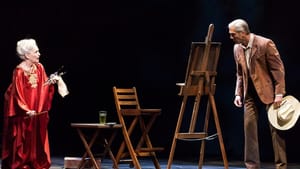Stay in the Loop
BSR publishes on a weekly schedule, with an email newsletter every Wednesday and Thursday morning. There’s no paywall, and subscribing is always free.
Immortal whining?
Opera Philadelphia's 'Coffin in Egypt': second review

When I hear the words "opera" and "Egypt," I immediately think of the pyramids and an enslaved Ethiopian princess named Aida, all sung in beautiful if incomprehensible Italian. I don’t usually think of a fading Southern belle singing arias in English with a slight Southern accent whining about the past. And yet, that’s what A Coffin in Egypt turned out to be — the reference being to Egypt, Texas rather than the Egypt of antiquity. Much as Priscilla, Queen of the Desert surprises us by heading to Las Vegas, so Coffin surprises us by offering another kind of princess in an emotional as well as actual desert.
I associate opera with grand stories of love and misery. In Coffin, 90-year-old Myrtle Bledsoe, sung by mezzo-soprano Frederica von Stade, is certainly miserable, as she tells us again and again and again. Her husband, Hunter Bledsoe (David Matranga), a man of few words, has fallen in love with his mistress — the mulatto Maude Jenkins, who read Hunter’s "love letters to the white boys at the Bordello" — leaving Myrtle to regret her fate and look elsewhere for happiness.
The cure for her misery, she tells us, was to leave her home and spend seven years traveling through Algiers, where she met a sheik; Paris where she learned to paint; Berlin; Venice; Madrid; and then New York, where the producer Mr. Frohman offered to make her a star. Myrtle is based on a real person, and there was, at the turn of the last century, an American theatrical producer named Charles Frohman, whose productions included James Barrie’s Peter Pan, or The Boy Who Wouldn't Grow Up, who died in 1915 in the sinking of the Lusitania; he, presumably, is the Mr. Frohman of whom she speaks.
After her travels she returns home, only to be betrayed again by her husband, so off she goes on another adventure, paid for by that very same husband.
But whether these tales of love and adventure are true or just her longing to be anywhere else than stuck in Egypt, Texas with a husband who doesn’t love her and two young girls is unclear. If they are true, one wonders why she returned home to continue her misery, although at that time women tended to stay in their marriages, particularly when, as in Myrtle’s case, they provided her with a life of ease if not of contentment. If they are not true, then we have a sense of how her longing for romance and adventure kept her going.
Frederica von Stade came out of retirement to play this role, and she’s definitely worth seeing and hearing. She holds the stage for the entire 80 minutes, and her performance is riveting.
A Kardashian opera?
The story, however, made me wonder what it would be like to see the life of someone like Paris Hilton or one of the Kardashians in opera form. They, too, are women who exist in the public eye because we have made them famous — not for what they have done or who they are deep down, but because they are rich, and we like to watch them, and they are willing to be watched. I don’t know them well enough to know if there is more depth than what we see in the media, but with Myrtle, too, she may have been loved by a sheik and courted by a producer for more than her looks, but the only activities of which she speaks are that she learned to paint in Paris and she likes to ride across the prairie and cry.
Even her personal tragedy — a husband who cheated on her, who killed the father of his 17-year-old mistress without punishment — is nothing notable in these days of constant infidelity among the rich and famous. Why should we care about her, other than because someone spent a lot of time and money to produce a play about her? That she endures is nothing surprising.
The play ends with a statement of forgiveness, but, after all that resentment, it’s rather hard to believe. We have come as a society to think that not forgiving is what ails us, but most people don’t forgive easily, and when they do it’s begrudgingly. I don’t believe for a minute that Myrtle actually forgives anyone around her, and her asking whether it’s too late to forgive herself seems rather disingenuous.
Opera has always had powerful women’s roles, and I commend Opera Philadelphia for bringing us modern operas with unique female leads. But as in last year’s Powder Her Face, those women are often more noted for their relationships with men than for any accomplishments of their own. To be rich and beautiful, and perhaps sexually active, is all it takes to matter in this world. There are exceptions, though: in Ainadamar, for instance, Margareta Xirgu, García Lorca’s muse, is a woman who stuck by her principles throughout her life.
But in opera, it’s the rare heroine who fights for a cause rather than for her man.
For Victor L. Schermer's review of A Coffin in Egypt, click here.
For Steve Cohen's review of A Coffin in Egypt, click here.
For our interview with von Stade, click here.
What, When, Where
A Coffin in Egypt, a chamber opera in one act, based on the play A Coffin in Egypt by Horton Foote. Music by Ricky Ian Gordon, libretto by Leonard Foglia. Leonard Foglia directed. Through June 15, 2014, Opera Philadelphia, Aurora Series for Chamber Opera, at the Perelman Theater, Kimmel Center for the Performing Arts, 300 S Broad St, Philadelphia. 215-893-1018 or www.operaphila.org.
Sign up for our newsletter
All of the week's new articles, all in one place. Sign up for the free weekly BSR newsletters, and don't miss a conversation.
 Naomi Orwin
Naomi Orwin